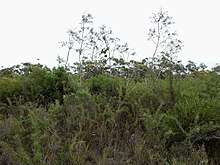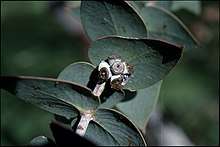Eucalyptus sturgissiana
Eucalyptus sturgissiana, commonly known as steel box[2] or Ettrema mallee,[3] is a species of mallee that is endemic to a small area of New South Wales. It has smooth, mottled bark, narrow lance-shaped adult leaves, often with juvenile leaves persisting in the crown, flower buds in groups of seven, white flowers and hemispherical to bell-shaped fruit.
| Steel box | |
|---|---|
 | |
| Eucalyptus sturgissiana near Tianjara Falls | |
| Scientific classification | |
| Kingdom: | Plantae |
| Clade: | Tracheophytes |
| Clade: | Angiosperms |
| Clade: | Eudicots |
| Clade: | Rosids |
| Order: | Myrtales |
| Family: | Myrtaceae |
| Genus: | Eucalyptus |
| Species: | E. sturgissiana |
| Binomial name | |
| Eucalyptus sturgissiana | |

Description
Eucalyptus sturgissiana is a mallee that typically grows to a height of 5 m (16 ft) and forms a lignotuber. It has smooth, mottled greyish to brownish or pink bark that is shed in ribbons. Young plants and coppice regrowth have glaucous stems and sessile leaves that are dull green to greyish, egg-shaped to round, 50–75 mm (2.0–3.0 in) long and 30–75 mm (1.2–3.0 in) wide, arranged in opposite pairs and often persist in the crown. Adult leaves are sometimes arranged in opposite pairs, the same shade of glossy green on both sides, narrow lance-shaped, 50–100 mm (2.0–3.9 in) long and 7–12 mm (0.28–0.47 in) wide, tapering to a petiole up to 10 mm (0.39 in) long. The flower buds are arranged in leaf axils in groups of seven on an unbranched peduncle 6–12 mm (0.24–0.47 in) long, the individual buds sessile or on pedicels up to 4 mm (0.16 in) long. Mature buds are oval to spindle-shaped, 6–7 mm (0.24–0.28 in) long and 4–5 mm (0.16–0.20 in) wide with a conical operculum. The flowers are white and the fruit is a woody, hemispherical to bell-shaped capsule 3–6 mm (0.12–0.24 in) long and 5–7 mm (0.20–0.28 in) wide with the valves near rim level.[2][3][4]
Taxonomy and naming
Eucalyptus sturgessiana was first formally described in 1972 by Lawrie Johnson and Donald Blaxell in Contributions from the New South Wales National Herbarium, from specimens they collected near the Nowra to Braidwood Road in 1970. The specific epithet honours James H. Sturgiss (1890-1983) who "discovered most of the known populations" of this species.[5][6]
Distribution and habitat
Steel box usually grows in small, pure stands on sandstone plateaus, mostly in the Morton National Park.[3][4]
References
- "Eucalyptus sturgissiana". Australian Plant Census. Retrieved 1 January 2020.
- K.Hill. "New South Wales Flora Online: Eucalyptus sturgissiana". Royal Botanic Gardens & Domain Trust, Sydney, Australia.
- Chippendale, George M. "Eucalyptus sturgessiana". Australian Biological Resources Study, Department of the Environment and Energy, Canberra. Retrieved 1 January 2020.
- "Eucalyptus sturgessiana". Euclid: Centre for Australian National Biodiversity Research. Retrieved 28 May 2020.
- "Eucalyptus sturgessiana". APNI. Retrieved 1 January 2020.
- "Sturgiss, James H. (Jim) (Major) (1890 - 1983)". Council of Heads of Australasian Herbaria Australian National Herbarium. Retrieved 1 January 2020.